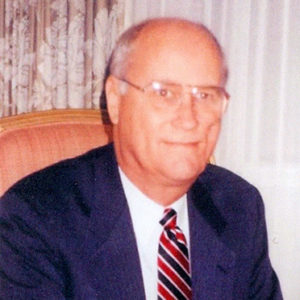calsfoundation@cals.org
Terrell Don Hutto (1935–2021)
Terrell Don Hutto was head of the Arkansas Department of Correction from 1971 to 1976, serving under Governor Dale Bumpers and later Governor David Pryor. Hutto arrived in Arkansas not long after the landmark Holt v. Sarver decision, which declared the entire state prison system unconstitutional. Hutto faced some controversy during his tenure, but he was largely successful in modernizing the state’s penitentiary and bringing it into compliance with federal prison standards. Hutto later worked as an administrator in the Virginia prison system and was one of the founders of the Corrections Corporation of America (CCA).
T. Don Hutto was born on June 8, 1935, in Sinton, Texas, to Terrell Sanford Hutto and Winnie Elvenia Cusler Hutto. Hutto’s father, who was a farmer, died when his son was nine years old. In 1958, Hutto graduated from East Texas University, where he was a double major in history and sociology. He later attended Southern Methodist University, American University, and Sam Houston State University, though his additional study did not result in a master’s degree. On June 10, 1960, Hutto married Nancy Sue Moore. The couple had three daughters.
Hutto served for several years in the army, working in the communications field in Washington DC. After his service, he returned to Texas, where he passed an examination to work in the prison system. From 1967 to 1971, he worked as a warden at Ramsey prison farm (officially known as W. F. Ramsey Unit) in southeastern Texas. Hutto’s work in Texas got him the attention of Governor Bumpers, who appointed him head of the Department of Correction on June 2, 1971. Hutto replaced Robert Sarver, a Winthrop Rockefeller appointee, who was the first head of the Department of Correction, which was established in 1968.
Under Hutto’s leadership, the department tried to combine more enlightened ideas of incarceration with modern disciplinary measures. Hutto had a reputation for toughness as well as a gift for tact and diplomacy. He had a good working relationship with Governor Bumpers and Governor Pryor, and he had friends in the Arkansas General Assembly, such as Knox Nelson. When he arrived in Arkansas, Hutto gave hundreds of talks throughout the state to promote his work in corrections and assure people the state penitentiary was moving into the modern era. Hutto had the prison system establish a school system, for example, and, in 1974, sixty-seven inmates received Graduate Equivalency Degrees (GEDs).
Nevertheless, some of Hutto’s methods aroused controversy. Initially, some Arkansans feared that a warden from Texas would enact changes that would lead to the “Texanization” of the prison system (even though the Texas prison system was actually much more professional and humane than Arkansas’s at the time). Hutto introduced unusual forms of punishment such as “Texas TV,” which involved an inmate standing two feet from a wall or fence and leaning his forehead or nose against the wall or fence for extended periods, sometimes for hours. Governor Bumpers himself tried doing this and said he could take it for only thirty seconds. Another introduction from the Texas penal system was grue (also referred to as nutraloaf or prison loaf), a bland loaf made of vegetables and meat that was fed to prisoners as punishment. In 1978, in the U.S. Supreme Court case of Hutto v. Finney, Justice John Paul Stevens ruled that the feeding of grue for weeks constituted cruel and unusual punishment.
Hutto’s main priority was hiring qualified officials and dismantling the longstanding trusty system, but some hires, such Tucker Unit’s superintendent Robert Britton, proved controversial. Britton, who worked in Texas previously, was accused of beating inmates. Prisoners claimed that he made them lie on the hood of his car while he drove at forty miles per hour, and Britton also apparently used racial epithets against black inmates and workers. On October 14, 1974, a group of 200 inmates at Cummins refused to work in protest of continued harsh conditions.
Hutto, nevertheless, helped Arkansas make significant gains toward becoming compliant with federal standards. In August 1973, Judge J. Smith Henley ruled that Arkansas’s prisons had made enough progress for Henley to relinquish jurisdiction. Inmates appealed the verdict, however, and the Eighth Circuit Court of Appeals ruled that the penitentiary was still unconstitutional. Hutto felt the decision was “untimely and in error,” and he believed the bad publicity was undermining his efforts and influencing the court. In 1976, an exhausted Hutto resigned his position at the Department of Correction.
By the time Arkansas achieved compliance with federal standards in 1982, Hutto had moved to Virginia. From 1977 to 1982, he worked as a warden in the Virginia Department of Corrections. In the 1980s, Hutto became a prominent national figure in the corrections field. He served for six years as president of the American Correction Association (ACA). In January 1983, Hutto was one of the co-founders of the Corrections Corporation of America, which operates prisons on a for-profit basis. The CCA was created in a time of massive prison expansion in the United States, and the rise of the prison industrial complex remains a controversial issue in the nation. In 1986, the ACA praised Hutto for his “commitment to excellence.” Hutto moved to Nashville, Tennessee, which is the location of the headquarters for the CCA. The T. Don Hutto Residential Center was founded in 1983. The facility, located in Taylor, Texas, is used as a detention center for undocumented immigrants.
Hutto was known for taking a sociological approach to penology, claiming that people needed not rehabilitation but “habilitation”: the proper upbringing and opportunities to prevent them from becoming criminals. He relayed his opinion that the death penalty does not act as a deterrent to crime and voiced criticism of supermax prisons’ institutionalized use of prolonged solitary confinement.
Hutto died on October 22, 2021, and was buried at Mount Olivet Cemetery in Nashville, Tennessee.
For additional information:
American Correctional Association. Proceedings of the Annual Congress of Correction. College Park, MD: American Correctional Association, 1986.
Jackson, Bruce. Killing Time: Life inside the Arkansas Penitentiary. Ithaca, NY: Cornell University Press, 1977.
Murton, Thomas O. The Dilemma of Prison Reform. New York: Holt, Rinehart, and Winston, 1969.
Obituary of Terrell Don Hutto. Tennessean, October 25, 2021. https://www.tennessean.com/obituaries/ten210451 (accessed January 3, 2023).
Colin Edward Woodward
Lee Family Digital Archive, Stratford Hall
 Cummins Prison Strike of 1974
Cummins Prison Strike of 1974 Divergent Prosperity and the Arc of Reform, 1968–2022
Divergent Prosperity and the Arc of Reform, 1968–2022 Law
Law Lockhart, Art
Lockhart, Art T. Don Hutto
T. Don Hutto 




Comments
No comments on this entry yet.